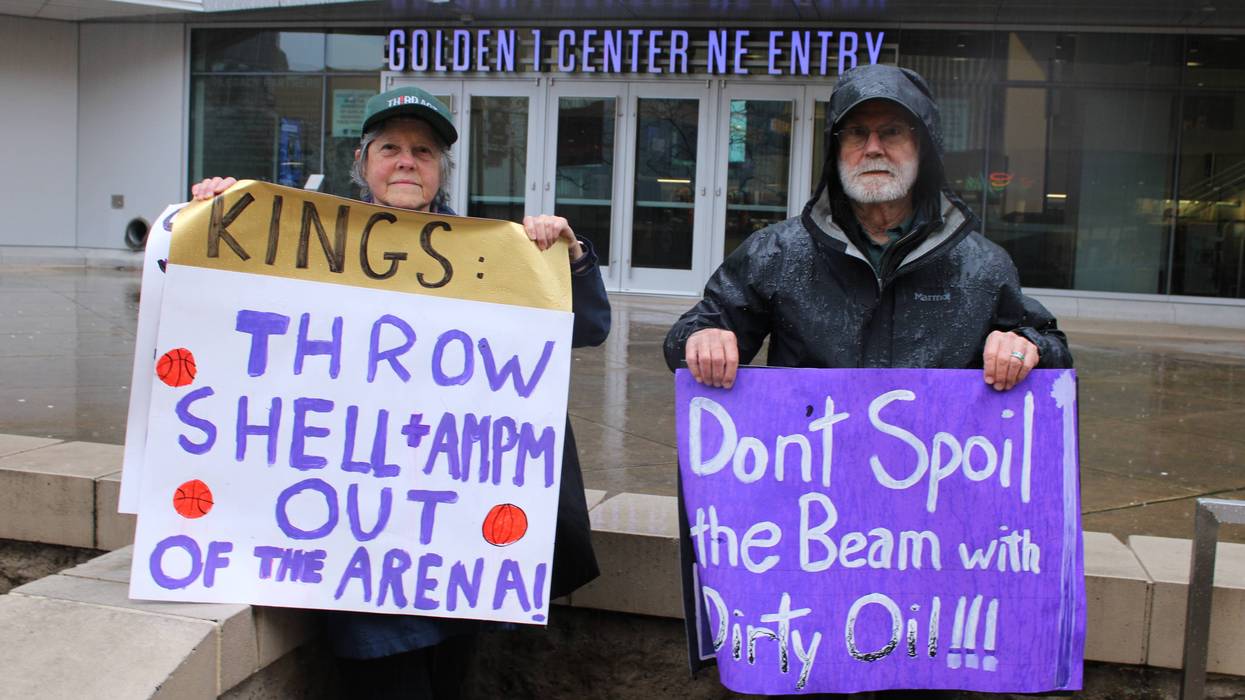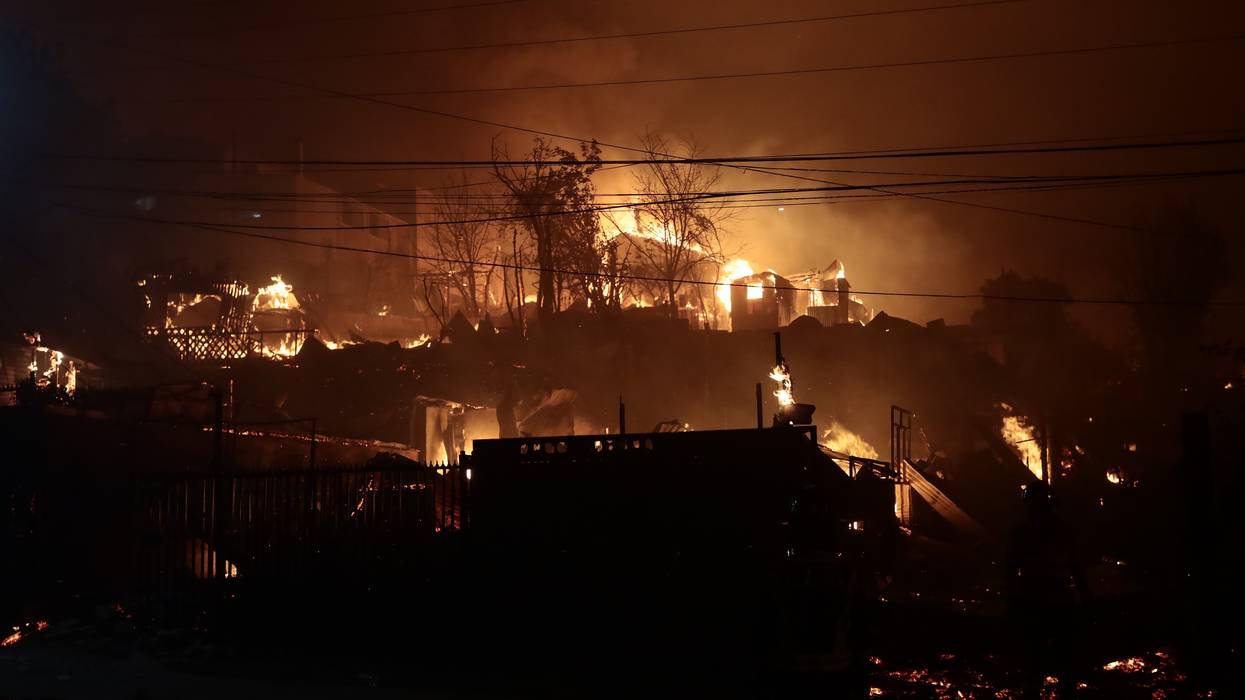But occasionally reality breaks through, Thursday afternoon in Belém, Brazil in the form of a very literal fire that apparently began in the Africa pavilion. The video was truly terrifying—this could have been truly awful.
Luckily, everyone reacted the way people should in an emergency. People warned each other, and evacuated. Firefighters arrived and used their tools to put out the blaze. Apparently 11 people are being treated for smoke inhalation, but all are expected to survive.
In other words, everyone behaved in precisely the opposite way they’ve reacted to the fire that’s begun to consume the Earth.
I’m not going to belabor this analogy—it’s painfully obvious. But sometimes the obvious is worth pointing out, because it doesn’t seem to have sunk in.
When I say the planet is on fire, I mean in many cases literally. We’ve already managed to mostly memory-hole the fact that large sections of America’s second-largest city burned to the ground earlier this year (though it has inspired forensic anthropologists to come up with new ways of identifying people burned to death; a special training with 10 donated cadavers is happening this week). Across the world blazes rage—somehow NASA’s new minders haven’t gotten around to taking down this page which points out the science in admirably straightforward terms:
Many different factors influence wildfire behavior, such as forest health, weather, topography, and forest management practices. A warming climate is increasing some types of fire activity, leading to larger and more destructive fires, more intensive firefighting efforts, and widespread smoke.
But of course it’s more than just fires. A heating planet has thousands of ways to do damage, from rain and flood to drought and storm. A new study, detailed here by ProPublica, counts the excess deaths simply from President Donald Trump’s about face on climate policy at 1.3 million souls:
Our calculations use modeled estimates of the additional emissions that will be released as a result of Trump’s policies as well as a peer-reviewed metric for what is known as the mortality cost of carbon. That metric, which builds on Nobel Prize-winning science that has informed federal policy for more than a decade, predicts the number of temperature-related deaths from additional emissions. The estimate reflects deaths from heat-related causes, such as heat stroke and the exacerbation of existing illnesses, minus lives saved by reduced exposure to cold. It does not include the massive number of deaths expected from the broader effects of climate change, such as droughts, floods, wars, vector-borne diseases, hurricanes, wildfires, and reduced crop yields.
The numbers, while large, are just a fraction of the estimated 83 million temperature-related deaths that could result from all human-caused emissions over the same period if climate-warming pollution is not curtailed. But they speak to the human cost of prioritizing US corporate interests over the lives of people around the globe.
“The sheer numbers are horrifying,” said Ife Kilimanjaro, executive director of the nonprofit U.S. Climate Action Network, which works with groups around the world to combat climate change.
“But for us they’re more than numbers,” she added. “These are people with lives, with families, with hopes and dreams. They are people like us, even if they happen to live in a different part of the world.”
Indeed, another new study now allows one to calculate how many deaths any new fossil fuel project can be expected to produce. As Patrick Canning writes:
In 2021 R. Daniel Bressler published a paper called “The Mortality cost of carbon,” proposing a method to estimate the number of deaths caused by the emissions of one additional metric ton of CO2. This opened the door to assessing the number of deaths per project, or per nation, industry, etc. But no one did it right away, it took some time to percolate.
After that I started advising my clients to insist of regulators that this calculation be made.
Then in July of this year a team based at University New South Wales, Sydney, Australia, did it. For the first time, they calculated the number of deaths which are likely to be caused by a particular project—Woodside’s Scarborough gas project.
The number for that one western Australian gas project? 484 people dead, and 16 million corals along the Great Barrier Reef.
Meanwhile, great reporting from Anupreeta Das highlights the toll from unrelenting heat on women in particular, making the point that it’s daily higher temperatures as much as extreme heatwaves that do the damage:
Every summer morning, Kantaben Kishen Parmar, a 45-year-old vegetable seller in the Indian city of Ahmedabad, settles onto a patch of ground the size of a large rug, sandwiched between the warming asphalt and a simmering sky, to sell peppers and tomatoes. She doesn’t get back home until 10:00 pm.
Over the decades, summers have gotten longer and hotter—average temperatures can hover around 105°F, or 40°C, between March and June—but Ms. Parmar’s hours have remained the same. The toll on her health is growing.
Three years ago, she collapsed during an especially scorching April day and was rushed to a hospital, where she was treated for severe dehydration. Ms. Parmar, who is diabetic, has suffered from urinary tract infections, dizzy spells, and heavy bleeding during her period, conditions that medical experts often attribute to heat stress.
“It’s hot from above, it’s hot from the pavement,” said Ms. Parmar as she deftly tossed green peppers onto a weighing scale with her right hand, which bears the tattoo of a heart pierced by an arrow encasing the letters “KK.” The other “K” stands for Kishen, her husband and partner in the business.
If dead people and dead coral and sick women don’t motivate leaders, perhaps money might? A fascinating new study found that the risk of fire and storms is driving up insurance costs, and hence driving down the value of homes, and by truly eye-watering amounts. As Claire Brown and Mira Rojanasakul explain:
The study, which analyzed tens of millions of housing payments through 2024 to understand where insurance costs have risen most, offers first-of-its-kind insight into the way rising insurance rates are affecting home values.
Since 2018, a financial shock in the home insurance market has meant that homes in the ZIP codes most exposed to hurricanes and wildfires would sell for an average of $43,900 less than they would otherwise, the research found. They include coastal towns in Louisiana and low-lying areas in Florida.
Changes in an under-the-radar part of the insurance market, known as reinsurance, have helped to drive this trend. Insurance companies purchase reinsurance to help limit their exposure when a catastrophe hits. Over the past several years, global reinsurance companies have had what the researchers call a “climate epiphany” and have roughly doubled the rates they charge home insurance providers.
In the end, all this derives from the fundamental damage being done to the Earth’s fundamental systems. One of the scarier reports I’ve read in a long time passed almost unnoticed earlier this month in the journal Nature. It documented exactly how fast the world’s forests and oceans are losing their ability to sequester carbon. As Zeke Hausfather and Pierre Friedlingstein explain:
Climate change has caused a long-term decline in land and ocean carbon sinks, with sinks being about 15% weaker over the past decade than they would have been without climate impacts.
The study, published in Nature, finds that the decline of carbon sinks has contributed about 8% to the rise in atmospheric CO2 concentration since 1960…
The combined effects of climate change and deforestation have turned tropical forests in south-east Asia and in large parts of South America from CO2 sinks to sources.
And these sinks will likely continue to weaken as long as atmospheric CO2 concentrations continue to rise and the world continues to warm. There are a wide range of estimates of carbon cycle feedbacks among climate models, but a large carbon cycle feedback could result in a few tenths of a degree of future warming.
There are a few people responding to the emergency in the fashion one might hope: Last week, for instance, the European Center for Human and Constitutional Rights filed a criminal complaint against TotalEnergies for its complicity in war crimes and torture associated with African gas projects. They are the equivalent of neighbors seeing a fire and getting on the phone to the authorities.
And there are some people reacting the way you’d expect arsonists to respond. With America absent from the Belém talks, Saudi Arabia has taken over the function of blocking action. As Damian Carrington points out in the Guardian, the kingdom gets $170,000 in oil revenues a minute, so no wonder they fight any effort to do anything:
More than a dozen obstruction tactics have been deployed, from disputing the agendas to claiming that strands of the talks have no mandate to discuss issues it dislikes such as phasing out fossil fuels—to insisting action to help vulnerable countries adapt to global heating is linked to compensating oil-rich nations for lost sales. Delay is a key aim and, for example, Saudi Arabia strongly opposed any virtual negotiations when Covid shut down the world in 2020. “They are really good at it, absolutely masterful,” says Dr Joanna Depledge at the University of Cambridge.
Mostly, though, the world just kind of stands by and watches. As the Belém talks staggered toward their end, Brazilian President Luiz Inácio Lula da Silva returned to help spur negotiators on, but he sounded oddly equivocal:
“We haven’t found another place to live,” Lula, flanked by Brazilian negotiators and his wife, said.
Lula and several other leaders are pushing to create a road map toward transition to renewable energies. But in his remarks Wednesday, he was careful to say there’s no intention to “impose anything on anybody,” that countries could transition at their own pace and count on financial help to do so.
Indeed, Bloomberg reports that the latest draft of the proposed text omits language about phasing out fossil fuels. Which—well, that’s the whole damned point.
And so, perhaps, we should leave the last word to Greta Thunberg, who near the beginning of her remarkable campaign said something that should resonate with the delegates currently standing outside the convention hall watching firefighters mop up




